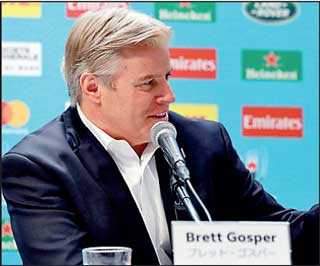Tuesday Feb 17, 2026
Tuesday Feb 17, 2026
Friday, 6 November 2020 00:00 - - {{hitsCtrl.values.hits}}
 |
| CEO Brett Gosper
|
LONDON (AFP): The financial fallout for rugby from the coronavirus pandemic has been “devastating”, with World Rugby effectively operating like a “central bank”, the governing body’s CEO Brett Gosper said on Monday.
European unions have been particularly badly affected due to the ban on spectators attending matches since the season resumed in mid-August, after it was originally halted by the coronavirus outbreak in March.
Fans did however attend the recent Bledisloe Cup games hosted by New Zealand and will also be permitted when Australia host the Rugby Championship.
Gosper said it was logical the hardest-hit unions were the largest ones with the biggest stadiums. “It has been devastating from a revenue point of view. The more reliant you are on game hospitality and ticketing particularly, the more devastating it will be. In the near future we are going to be getting some good broadcast revenues, but the rest of the picture is pretty weak,” the Australian said in a conference call. England’s Rugby Football Union (RFU) is traditionally the wealthiest in the northern hemisphere. However, their CEO Bill Sweeney predicted last week they are looking at a potential short-term impact of around 145 million pounds ($ 187 million) in lost revenues. The RFU is seeking help from the British government. Their Irish counterparts, the IRFU, on Monday received 18 million euros from the state, which will help deal with a record deficit of 35.7 million euros. Gosper, 61, said hopefully the sport can survive, providing things return to some form of normality next year. “We’re operating a little bit as a central bank, trying to advance monies to these unions to see them through from a cash-flow point of view,” he said.
“We have earmarked around $ 100 million. We are distributing that to around 30 unions in six regions. It is the higher revenue unions that are most in trouble, in terms of the holes being created. Hopefully we can see this through if things start to get back to normality, whatever that is, halfway through next year. It’s putting huge pressure on unions and they all are in different shape in terms of their own reserves, their own outlook and revenue mix and so on,” Gosper added.
Gosper, a former advertising executive who joined World Rugby in 2012, said the distribution of the funds was decided by an arbitration process.
“We are contributing to about 30 unions, in particular 20, and probably the majority does go to the top 10 unions, because it’s where the majority of the revenue is. They generate a lot of the revenue for other unions, whether it comes from World Cups or elsewhere,” he said.
Gosper says World Rugby too has had to cut its cloth.
“We are very fortunate that we have got a Rugby World Cup (in Japan) away just in time and our next World Cup is now three years away and it will be a bumper World Cup in revenue terms,” he said.
“So, we can be relatively optimistic. We have taken our own precautions, changed our forecasting, cut budgets significantly. If we spend 600 million over a four-year period, we have cut at least 10% of that budget and found those savings and those savings find themselves helping the unions,” Gosper said.